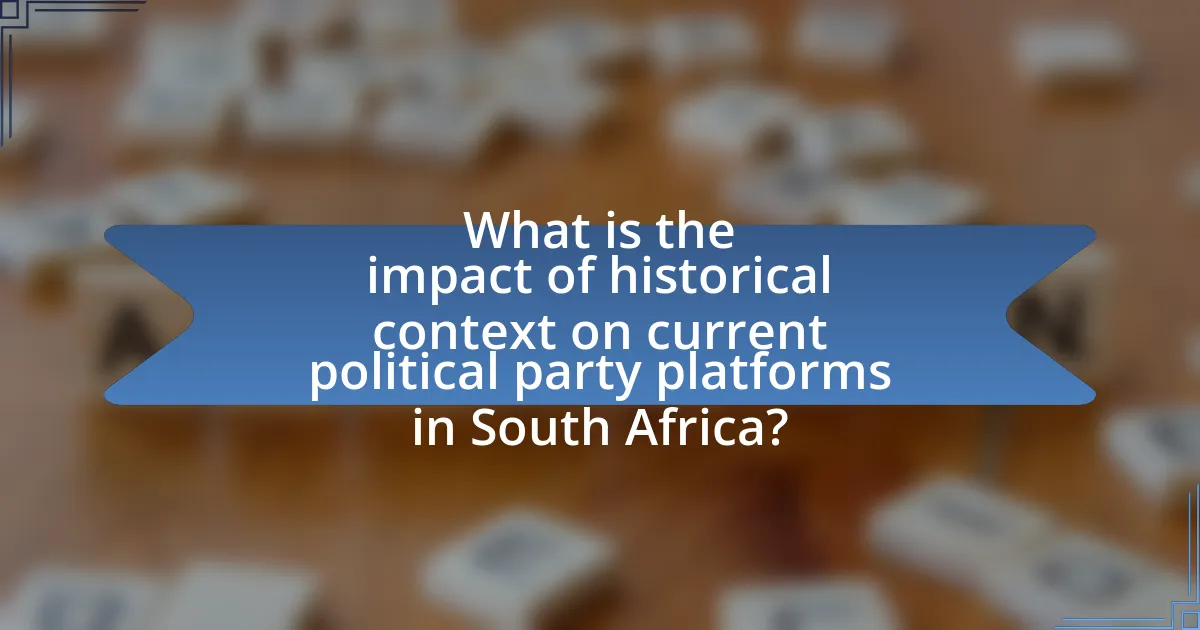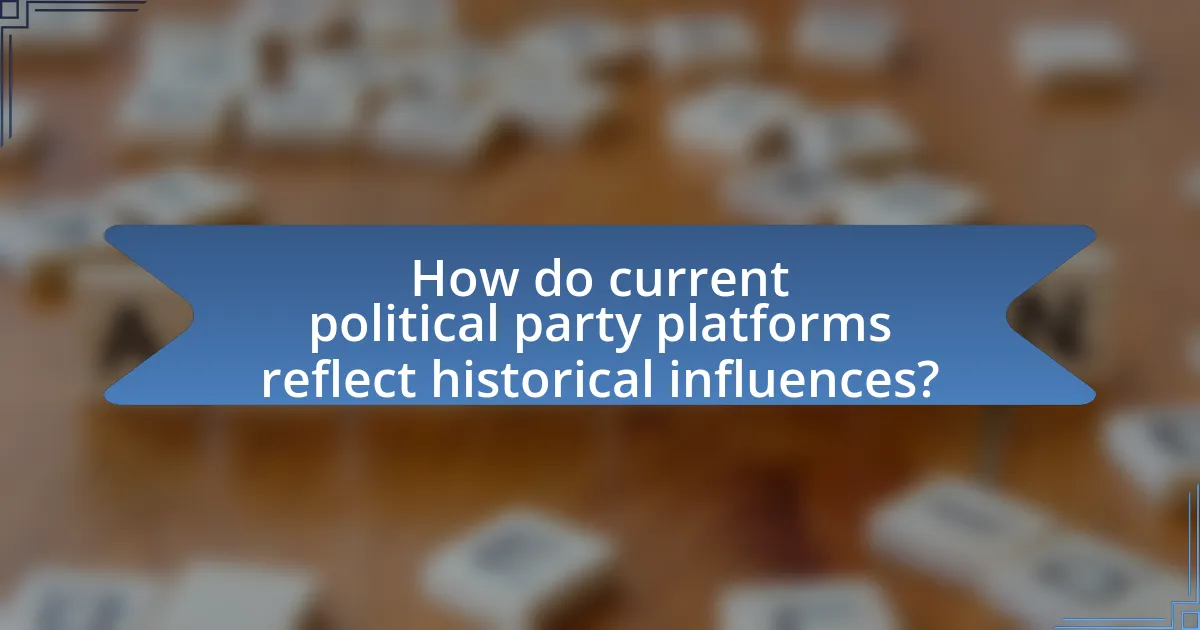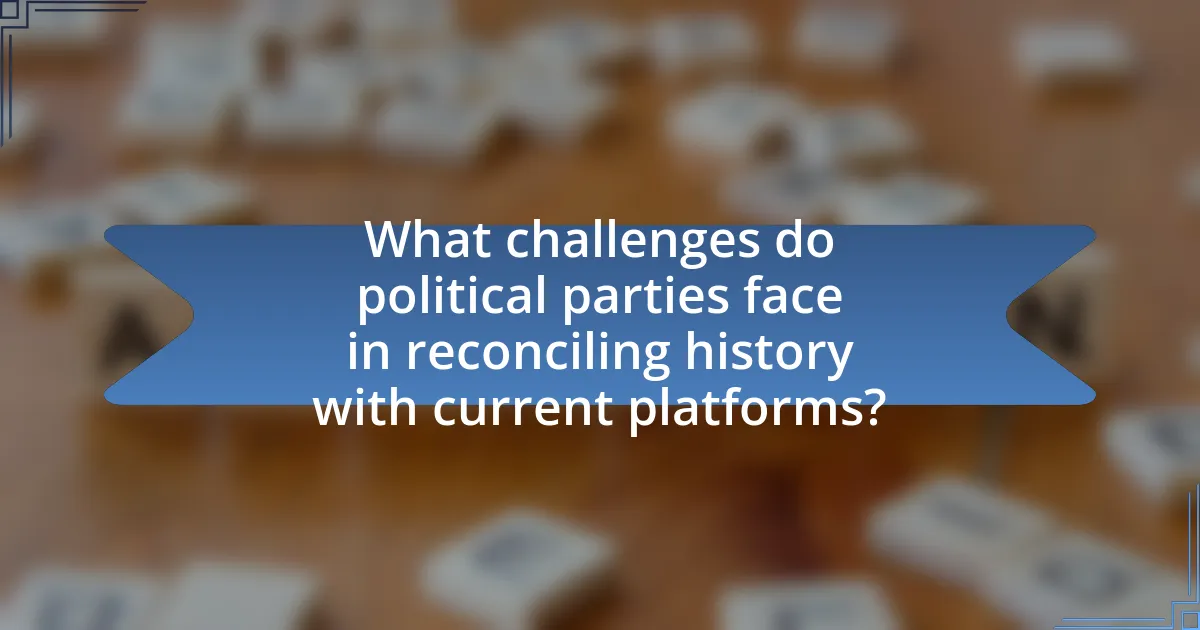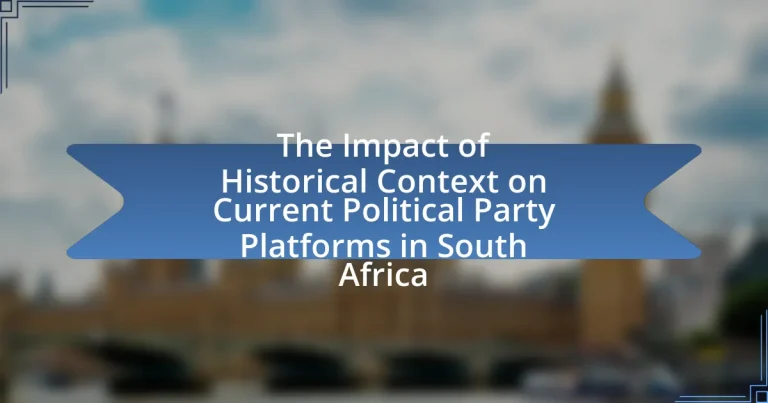The article examines the significant impact of historical context on the political party platforms in South Africa, particularly influenced by the legacy of apartheid and colonialism. It highlights how these historical factors shape party ideologies, policies, and voter bases, with a focus on major parties like the African National Congress (ANC) and the Economic Freedom Fighters (EFF). Key historical events, such as the establishment of apartheid and the transition to democracy in 1994, are discussed in relation to their influence on current political dynamics, including land reform and economic inequality. The article also addresses the challenges political parties face in reconciling historical grievances with contemporary voter expectations and the strategies they employ to navigate these complexities.

What is the impact of historical context on current political party platforms in South Africa?
The historical context significantly shapes current political party platforms in South Africa by influencing their ideologies, policies, and voter bases. The legacy of apartheid, for instance, has led parties like the African National Congress to prioritize social justice and economic equality, reflecting the struggles against racial oppression. Additionally, the historical context of colonialism and resistance movements informs the platforms of smaller parties, such as the Economic Freedom Fighters, which advocate for radical economic transformation. The 1994 democratic transition established a framework that continues to affect party strategies, as parties must address historical grievances while appealing to a diverse electorate. This interplay between history and contemporary politics is evident in the ongoing debates about land reform and economic disparities, which are rooted in South Africa’s past.
How has South Africa’s history shaped its political landscape?
South Africa’s history has profoundly shaped its political landscape, primarily through the legacy of apartheid and colonialism. The apartheid system, which enforced racial segregation from 1948 to the early 1990s, created deep socio-economic divides and entrenched racial inequalities. This historical context has led to the formation of political parties that address these disparities, such as the African National Congress (ANC), which emerged as a liberation movement and has dominated post-apartheid politics. The ANC’s policies reflect the need to rectify historical injustices, focusing on land reform and economic empowerment for previously marginalized communities. Additionally, the rise of other parties, like the Economic Freedom Fighters (EFF), illustrates the ongoing struggle for economic equity, rooted in the historical context of exploitation. Thus, South Africa’s political landscape is a direct reflection of its tumultuous history, influencing party platforms and voter priorities.
What key historical events have influenced political party formation?
Key historical events that have influenced political party formation in South Africa include the establishment of apartheid in 1948, the anti-apartheid struggle, and the transition to democracy in 1994. The apartheid regime created a racially segregated society, leading to the formation of parties like the African National Congress (ANC) and the Pan Africanist Congress (PAC) that opposed racial discrimination. The resistance movements, including strikes and protests, galvanized support for these parties and shaped their platforms. The end of apartheid and the first democratic elections in 1994 marked a significant shift, resulting in the ANC becoming the dominant political party, while other parties emerged to represent various interests, such as the Democratic Alliance (DA) and the Economic Freedom Fighters (EFF). These events collectively laid the foundation for the current political landscape in South Africa.
How did apartheid policies affect political ideologies?
Apartheid policies significantly shaped political ideologies in South Africa by institutionalizing racial segregation and oppression, which led to the emergence of resistance movements and alternative ideologies. The implementation of apartheid from 1948 to the early 1990s entrenched a system that marginalized non-white populations, prompting the development of ideologies centered around anti-colonialism, nationalism, and social justice. For instance, the African National Congress (ANC) adopted a platform advocating for equality and human rights, directly opposing the apartheid regime’s discriminatory practices. Additionally, the apartheid system catalyzed the formation of various political groups, such as the Pan Africanist Congress, which emphasized African nationalism and self-determination. These ideological shifts were crucial in mobilizing support for the anti-apartheid struggle and ultimately influenced the democratic framework established post-apartheid, reflecting a commitment to inclusivity and equality in South Africa’s political landscape.
What role does historical context play in party platform development?
Historical context significantly influences party platform development by shaping the priorities, values, and policies that political parties adopt. In South Africa, the legacy of apartheid has led parties to focus on issues such as social justice, economic equality, and reconciliation, reflecting the historical struggles and aspirations of the population. For instance, the African National Congress (ANC) emerged from a history of resistance against racial oppression, which informs its platform centered on addressing inequalities and promoting inclusive growth. This historical backdrop ensures that party platforms resonate with the electorate’s lived experiences and expectations, thereby guiding their political agendas and strategies.
How do historical grievances manifest in current party policies?
Historical grievances manifest in current party policies through the prioritization of issues such as land reform, economic inequality, and social justice. For instance, the African National Congress (ANC) incorporates land redistribution in its policies as a response to the historical injustices of apartheid, where land was systematically taken from black South Africans. This is evidenced by the ANC’s commitment to the Land Expropriation Bill, aimed at addressing past dispossessions. Similarly, the Economic Freedom Fighters (EFF) emphasizes economic redress and wealth redistribution, reflecting the historical context of economic disenfranchisement faced by marginalized communities. These policies are direct responses to the historical grievances that continue to influence the socio-political landscape in South Africa today.
What historical narratives are used by political parties today?
Political parties in South Africa today utilize historical narratives that emphasize the struggle against apartheid, the importance of reconciliation, and the legacy of liberation movements. The African National Congress (ANC) often references the anti-apartheid struggle and figures like Nelson Mandela to reinforce its commitment to social justice and equality. The Democratic Alliance (DA) focuses on narratives of non-racialism and good governance, drawing on the historical context of diverse communities working together against oppression. The Economic Freedom Fighters (EFF) invoke the history of land dispossession and economic inequality to advocate for radical economic transformation. These narratives shape party platforms by framing contemporary issues within the context of historical injustices, influencing voter perceptions and policy priorities.

How do current political party platforms reflect historical influences?
Current political party platforms in South Africa reflect historical influences through the incorporation of past ideologies, struggles, and socio-economic contexts that shaped the nation. For instance, the African National Congress (ANC) draws heavily from its anti-apartheid legacy, emphasizing social justice and equality, which are rooted in the historical fight against racial oppression. Similarly, the Democratic Alliance (DA) reflects its historical roots in liberalism and the promotion of individual rights, stemming from its origins in the anti-apartheid movement. The Economic Freedom Fighters (EFF) channel the historical context of land dispossession and economic inequality, advocating for radical economic transformation. These platforms are thus not only a response to contemporary issues but also a continuation of historical narratives that inform their policies and objectives.
What are the main political parties in South Africa today?
The main political parties in South Africa today are the African National Congress (ANC), the Democratic Alliance (DA), and the Economic Freedom Fighters (EFF). The ANC, which has been in power since the end of apartheid in 1994, focuses on social justice and economic transformation. The DA, established in 2000, advocates for liberal policies and good governance, while the EFF, founded in 2013, promotes radical economic change and land reform. These parties reflect the diverse political landscape shaped by South Africa’s historical context, including the legacy of apartheid and ongoing socio-economic challenges.
How do the ANC’s policies reflect its historical roots?
The African National Congress’s (ANC) policies reflect its historical roots through a commitment to anti-colonialism, social justice, and economic equality, which stem from its origins in the struggle against apartheid. The ANC was founded in 1912 to oppose racial discrimination and promote the rights of black South Africans, leading to the adoption of policies aimed at dismantling systemic inequalities. For instance, the ANC’s post-apartheid policies, such as the Reconstruction and Development Programme (RDP), emphasize socio-economic transformation and access to basic services, directly linking back to its historical mission of achieving equality and justice for marginalized communities. This continuity illustrates how the ANC’s foundational principles shape its current policy framework, reinforcing its dedication to addressing the historical injustices faced by its constituents.
What historical influences shape the DA’s platform?
The Democratic Alliance’s platform is shaped by historical influences such as the anti-apartheid movement, the legacy of liberalism in South Africa, and the transition to a democratic government in 1994. The DA emerged from the Progressive Party, which advocated for equal rights and opposed apartheid policies, reflecting a commitment to liberal democratic values. Additionally, the party’s focus on non-racialism and economic liberalization is rooted in the historical context of South Africa’s struggle against racial segregation and its pursuit of a more inclusive society. The DA’s platform also draws from the need to address socio-economic disparities that were entrenched during apartheid, emphasizing policies aimed at promoting equality and opportunity for all citizens.
How do party platforms address historical injustices?
Party platforms in South Africa address historical injustices by explicitly acknowledging past wrongs, such as apartheid and colonialism, and proposing policies aimed at redressing these issues. For instance, the African National Congress (ANC) emphasizes land reform and economic empowerment for historically marginalized communities as part of its platform, reflecting a commitment to rectify the socio-economic disparities created by apartheid. Additionally, the Economic Freedom Fighters (EFF) advocates for the nationalization of land and resources to address the injustices faced by black South Africans. These platforms often include specific measures, such as affirmative action and education reforms, to promote equality and social justice, demonstrating a direct response to the historical context of inequality in South Africa.
What specific policies aim to rectify past inequalities?
Specific policies that aim to rectify past inequalities in South Africa include the Affirmative Action policy, Black Economic Empowerment (BEE), and land reform initiatives. Affirmative Action seeks to promote equal opportunities in employment and education for historically disadvantaged groups, addressing the legacy of apartheid. Black Economic Empowerment aims to increase the economic participation of black South Africans in the economy, with measures such as ownership targets and procurement policies. Land reform initiatives focus on redistributing land to rectify historical injustices related to land ownership, with the goal of ensuring equitable access to land resources. These policies are designed to create a more equitable society by addressing systemic disparities rooted in South Africa’s historical context.
How do parties use historical context to appeal to voters?
Parties in South Africa use historical context to appeal to voters by referencing past struggles and achievements to create emotional connections and establish credibility. For instance, the African National Congress (ANC) often highlights its role in the anti-apartheid movement to resonate with voters who value freedom and equality, leveraging the historical significance of figures like Nelson Mandela. This strategy is effective as it taps into collective memory and national identity, reinforcing the party’s legitimacy and relevance in contemporary issues. Additionally, parties may invoke historical injustices, such as land dispossession, to advocate for policies that address these grievances, thereby mobilizing support from affected communities.

What challenges do political parties face in reconciling history with current platforms?
Political parties in South Africa face significant challenges in reconciling their historical legacies with current platforms, primarily due to the complex socio-political landscape shaped by apartheid and its aftermath. These challenges include addressing the expectations of diverse voter bases that have different historical experiences and grievances, which can lead to conflicting demands on party policies. For instance, the African National Congress (ANC) must balance its revolutionary history with the need to appeal to a younger, more economically focused electorate that prioritizes issues like job creation and corruption over historical narratives. Additionally, parties must navigate the risk of alienating constituents who feel that historical injustices have not been adequately addressed, such as land reform and economic inequality, which remain contentious issues in contemporary politics. This reconciliation process is further complicated by the need to maintain party unity while adapting to changing societal values and expectations, making it a delicate balancing act for political entities in South Africa.
How do historical divisions impact party unity?
Historical divisions significantly undermine party unity by creating factions that prioritize divergent interests over collective goals. In South Africa, the legacy of apartheid has led to deep-seated ideological splits within political parties, such as the African National Congress (ANC) and the Economic Freedom Fighters (EFF). These divisions manifest in conflicting policy priorities and internal power struggles, which hinder cohesive action and dilute the effectiveness of party platforms. For instance, the ANC has faced challenges in maintaining unity due to differing views on land reform and economic policy, reflecting historical grievances that continue to influence contemporary political dynamics.
What are the consequences of historical rivalries on coalition politics?
Historical rivalries significantly influence coalition politics by creating distrust and complicating alliances among political parties. In South Africa, the legacy of apartheid has led to enduring divisions between parties such as the African National Congress (ANC) and the Democratic Alliance (DA), which often struggle to collaborate due to their historical antagonism. This rivalry results in fragmented coalitions that are less stable and more prone to conflict, as parties prioritize their historical grievances over collaborative governance. For instance, the ANC’s historical dominance and the DA’s opposition have shaped voter perceptions, making coalition-building challenging and often leading to political deadlock.
How do parties navigate differing historical narratives among constituents?
Political parties in South Africa navigate differing historical narratives among constituents by employing inclusive dialogue and tailored messaging strategies. These strategies involve acknowledging diverse historical experiences and perspectives, which helps to build trust and foster a sense of belonging among constituents. For instance, the African National Congress (ANC) often emphasizes its role in the anti-apartheid struggle to resonate with voters who value liberation history, while other parties may highlight different aspects of South Africa’s past to appeal to their specific voter bases. This approach is supported by research indicating that political narratives significantly influence voter alignment and party loyalty, as seen in studies conducted by the Institute for Justice and Reconciliation, which highlight the importance of historical context in shaping contemporary political identities.
What strategies can parties employ to address historical context effectively?
Political parties can employ strategies such as inclusive dialogue, educational initiatives, and historical acknowledgment to address historical context effectively. Inclusive dialogue involves engaging diverse community voices to understand different perspectives on historical events, fostering a sense of shared history. Educational initiatives can include workshops and public campaigns that inform citizens about the historical injustices faced by various groups, thereby promoting awareness and understanding. Historical acknowledgment requires parties to openly recognize past wrongs and their ongoing impact, which can help build trust and credibility with constituents. For instance, the African National Congress has often referenced the legacy of apartheid in its policies to resonate with voters who experienced its effects, demonstrating the importance of historical context in shaping current political platforms.
How can political parties balance historical acknowledgment with future goals?
Political parties can balance historical acknowledgment with future goals by integrating lessons from the past into their policy frameworks while promoting progressive agendas. For instance, South African political parties, such as the African National Congress, often reference the struggle against apartheid to emphasize the importance of social justice and equality in their current policies. This historical context informs their commitment to addressing economic disparities and fostering inclusive growth, which aligns with their future objectives of national development and unity. By doing so, they not only honor their historical legacy but also create a roadmap that resonates with contemporary societal needs, ensuring that their future goals are rooted in a well-understood past.
What best practices can enhance the relevance of historical context in party platforms?
Incorporating historical context into party platforms can be enhanced by utilizing specific best practices such as integrating historical data, engaging with community narratives, and ensuring transparency in historical references. Historical data, such as the impact of apartheid policies on current socio-economic conditions, provides a factual basis for understanding contemporary issues. Engaging with community narratives allows parties to connect with constituents’ lived experiences, making historical context more relatable and relevant. Transparency in historical references, including clear citations of past events and their implications, fosters trust and credibility among voters. These practices ensure that party platforms are not only informed by history but also resonate with the electorate’s current realities.


